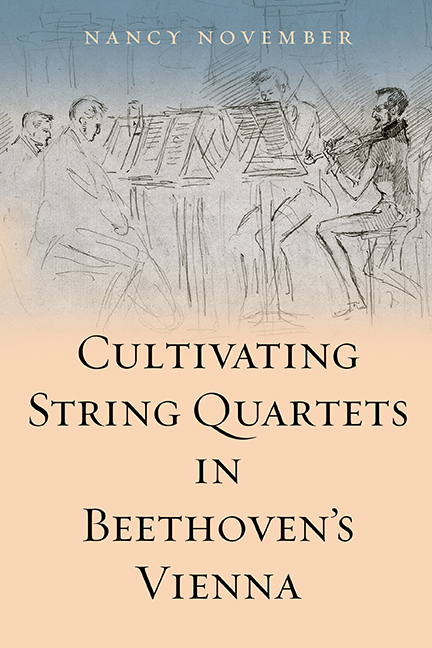Book contents
- Frontmatter
- Contents
- List of Illustrations
- List of Musical Examples
- Acknowledgements
- Introduction
- 1 Defining Chamber Music in the Early Nineteenth Century
- 2 Celebrating Haydn, Cultivating Opera
- 3 Selling String Quartets in Beethoven's Vienna
- 4 Locating String Quartets in Beethoven's Vienna
- 5 Early Nineteenth-Century Performance and Criticism
- 6 Sociability, Showmanship, and Study: ‘Quartet Friends’
- 7 The String Quartet and the Listener
- 8 Schubert's Song, Beethoven's Theatricality
- Epilogue: Constructing ‘Viennese Chamber Music’
- Bibliography
- Index
8 - Schubert's Song, Beethoven's Theatricality
Published online by Cambridge University Press: 16 May 2018
- Frontmatter
- Contents
- List of Illustrations
- List of Musical Examples
- Acknowledgements
- Introduction
- 1 Defining Chamber Music in the Early Nineteenth Century
- 2 Celebrating Haydn, Cultivating Opera
- 3 Selling String Quartets in Beethoven's Vienna
- 4 Locating String Quartets in Beethoven's Vienna
- 5 Early Nineteenth-Century Performance and Criticism
- 6 Sociability, Showmanship, and Study: ‘Quartet Friends’
- 7 The String Quartet and the Listener
- 8 Schubert's Song, Beethoven's Theatricality
- Epilogue: Constructing ‘Viennese Chamber Music’
- Bibliography
- Index
Summary
‘Beethoven's Vienna’ in this book's title is partly an imaginative construct. Schubert and Beethoven lived contemporaneously, composed works in similar genres, and spent most of their lives in Vienna. Yet their careers were almost completely separate. As Raymond Erickson notes, ‘It may justly be said that the two composers, who met only once, lived at the same time in different Viennas.’ This chapter starts by considering their different experiences of Vienna in terms of chamber music culture, especially regarding publication, performance, and reception. This brings into focus two distinct main strands in Viennese string quartet culture in the early nineteenth century, which have been emerging in the preceding chapters: the one geared towards public performance and canon formation, the other towards private entertainment and sociability in the home. The two composers’ experiences of Vienna also shared fundamental similarities – a disruptive and restrictive socio-political climate and a rage for song, opera, and theatre – which also left traces on both composers’ chamber works. Of course, neither composer was merely reacting to his milieu: each was an active agent, helping through his compositional and career choices to shape the musical cultures of the era, especially by offering new challenges to performers and listeners.
To compare Beethoven's and Schubert's experiences of Vienna is to draw attention to the extraordinary nature of both careers. Beethoven, above all other composers of his time, was involved in the processes of canon formation and the development of new ideas of the musical ‘work’, which emerge with particular clarity in Viennese string quartet culture at this time. His quartets, in particular, figure in the discussions of ‘selfless’ performance, some of the first score publications of chamber music, and the first semi-public, professional chamber music series for elite audiences, all of which were related to the emerging idea of ‘serious’ listening. In his energetic and influential involvement with these processes, Beethoven differed from most other composers of chamber music of his day, including his slightly younger contemporaries Onslow, Hänsel, Krommer, and Schubert.
But Beethoven's difference – from Schubert and from other composers – has been overemphasised, leading to problematically simple historical constructs: for example, the notion that Schubert and others composed string quartets ‘in Beethoven's shadow’; or that Beethoven's quartets are largely ‘autonomous’, cut off from the context of their composition.
- Type
- Chapter
- Information
- Cultivating String Quartets in Beethoven's Vienna , pp. 198 - 221Publisher: Boydell & BrewerPrint publication year: 2017



